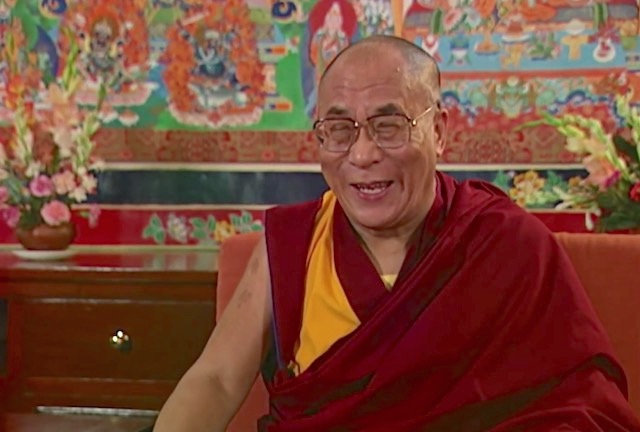
{Cutting Through} is a new column on elephantjournal.com. Have a question about meditation, mindfulness, or Buddhism? Please send it to Travis at [email protected] or in a comment on this article. Travis is an authorized meditation instructor in the Shambhala Buddhist lineage and the Center Director of Shambhala St. Petersburg. He is a joyful student of Sakyong Mipham Rinpoche.
Question: I feel like one of the “hopes” of the practice is that you become less reactive to the bad stuff, and don’t get weighed down in it for as long. But when something good happens and it makes you happy, should we also try not to let those feeling totally rock our emotions, even if they’re rocking them in a way that feels amazing?
~
Great question.
Let’s first explore what is happening when we become less reactive to the bad stuff, as it applies to the rest of your question too.
As we learn to live our lives with more mindfulness and awareness, we are retraining the way our mind and body operates. We’re breaking habits and creating new ones.
This leads us to being able to better deal with situations that trigger strong emotional reactions. In our meditation practice, when we notice we’ve become distracted from the focus of our attention, we gently, but deliberately, return our attention to our object of meditation or experience. The repeated going and coming back, going and coming back, begins to retrain our conditioned and reactionary ways of responding to our lives.
More and more, we’re able to just be, and the more we’re able to have some control over our experience. In Turning the Mind Into an Ally, Sakyong Mipham describes our minds when we begin to meditate as wild horses running erratically and out of control all over the field. As the rider of the horse, we’re taken in whichever direction the horse decides to fly off to.
As we begin to settle and synchronize our mind and body—or rider and horse—the presence of our mindfulness and awareness begins to permeate our everyday consciousness. It’s never too far out of reach. The taste never completely leaves our mouth.
So, when our Aunt Betty backs into our car while trying to leave the driveway causing $864 in damage, our reaction may be drastically different than before we began to be processed by our practice and its results. We may have been thrown for a loop that lasted days or weeks, fuming and boiling under our collar, giving ourselves ulcers or feelings of depression. We may (I speak from vast experience) have said something we shouldn’t, or we may even permanently damage a relationship…or car or house.
How does our mindfulness meditation practice help?
After spending many, many hours working with the technique on the cushion and off, we start to see that we’ve been learning to notice without reacting. There is some space between what happens and our response to it. Furthermore, by noticing when we’re distracted and coming back to the technique (over and over and over), we’ve learned to let things go and not hold onto them and fuel them with further aggression or unskillful behavior.
As Captain Jack Sparrow said, “The problem is not the problem. Your attitude about the problem is the problem.”
So, when Aunt Betty knocks our bumper off, we will still feel that surge of WTF, but we hopefully will not totally be thrown off our mindfulness seat. If we’re well-trained, we may notice right away that we’re feeling a rush of anger and hostility toward Aunt Betty, and we might stop ourselves before blurting out that hurtful retort—or worse.
At the most basic level, we hope to not cause further harm to ourselves and others.
Next, we may notice that emotional upheavals dissipate more quickly as a result of our newly formed habit—if we can just sit with the always fleeting feeling and drop the storyline. We’ve behavioral therapy’ed ourselves into being aware of old patterns and having the ability to not be hooked by them.
So, what about the good feelings? You asked: should we also try not to let the amazing feelings totally rock our emotions?
I feel like in both cases, we’re never trying to manipulate our feelings. At the same time, we learn that we really don’t need to feel guilt or shame about them either. After we begin to identify with—or even as—awareness itself (which is the interconnected beingness of everything), we learn to somewhat dis-identify with the ephemeral thoughts and emotions that rise and fall within the space of our experience.
When we learn to break the habit of being led around by our discursive minds, we find that there is an ocean of contentment, well-being, and sanity right underneath all our conditioned, self-frustrating behaviors.
When we’ve learned to tame our minds through the meditation practice, and spend more time connected to the experience of our basic goodness, the less attached we become to either extreme.
We no longer have to manufacture or chase over-the-top happy experiences. When we start from a place of health and well-being, we no longer need to grasp for the hysteria of the highs or run from the pain of the lows. We’re in-tune with reality enough to know that these extremes come and go; they are part of the fluctuations of ordinary life. They are temporary and based on causes and conditions.
So, speaking of the negative experiences, we don’t have to fear them. We see them for what they are—storm clouds passing through a fundamentally clear, blue sky.
For the positive, amazing-feeling emotions, we see the same pattern. So, we can just relax and enjoy it fully. We can feel the positive energy and feelings in our body, and not try to foolishly hold onto them and try to make them last forever, nor do we need to suffer because we know the feelings will end.
What makes it easier to do this is being processed, to whatever extent we’re at currently, by our practice. If our baseline experience is relaxing into that feeling of our basic goodness, i.e., good already, then suppressing negative experiences, or artificially drumming up positive ones, is no longer necessary.
Let’s not think there is anything wrong with feeling amazing either. That would be a twisted position to take. But, the more skillful way to work with that feeling is to not chase it or try to hold on to it (because it’s not possible, which just leads to suffering), and just be with it while it’s there with a sense of appreciation and inquisitiveness.
Also, bonus: the more we are not doing things that cause us suffering, the more time we have to touch in and be with our inherent well-being and wholeness.
This begins to be a sort of everyday amazingness that we see and connect to as the ocean of our experience upon which the little waves rise and fall.
~
More from Travis:
{Cutting Through}: Organized Religion. What if I like Meditation but Buddhism Freaks Me Out? {Weekly Q & A}
{Cutting Through}: Anger. When will Meditation Stop my Feelings of Anger? {Weekly Q & A}
Meditation is Essentially Addressing this One Point.
~
~
~
Author: Travis May.
Image: YouTube still
Copy Editor: Callie Rushton


 Share on bsky
Share on bsky




Read 23 comments and reply